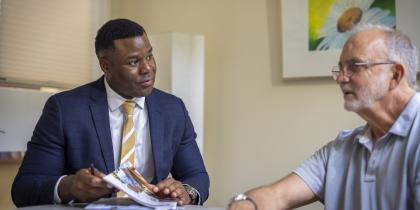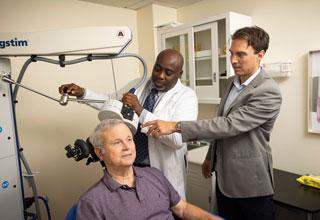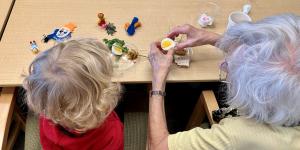Depression in Seniors
Learn about the symptoms, why depression can be harder to treat in older adults, and new treatments that can help.

Aging can bring many joys, like seeing children and grandchildren grow up, having time to spend on hobbies or travel, and a focus on the parts of life that matter most. Studies show that our later years can be some of our happiest. It’s a time when many older adults become more satisfied with their lives and clearer about their purposes and values.
That said, about 18% of adults age 65 and older are affected by depression. Depression is a treatable medical condition that should never be considered a part of normal aging. While treatment may be more complicated as we get older, relief from the symptoms is possible.
As a psychiatrist at Hebrew SeniorLife’s Deanna and Sidney Wolk Center for Memory Health in Boston, my goal is to help older adults treat and manage their depression in order to achieve the best possible mental and cognitive health.
What are the symptoms of depression in older adults?
Depression is a mood disorder that affects the way you think, feel, and act. It can also impact your personal relationships. Symptoms can be mild to severe and cause feelings of sadness and a loss of interest in activities that you once enjoyed.
However, depression goes beyond just feeling sad. Other symptoms can include:
- Changes in appetite or weight – either loss or gain – that are unrelated to intentional dieting
- Trouble sleeping or sleeping too much
- Loss of energy
- Restlessness, or an inability to sit still
- Feeling worthless or guilty
- Difficulty thinking, concentrating or making decisions
- Thoughts of suicide
Compared with other age groups, seniors with untreated depression are more likely to experience more episodes of fatigue, bigger fluctuations in appetite and sleep, and difficulty with cognitive functioning
Suicide is a real concern among older adults, and rates are particularly high among older men. Men age 85 and older have the highest suicide rate of any group in the U.S.
While depression may feel hopeless, the right treatment plan and support can bring you back to enjoying the people and activities that matter to you.
Is there a link between aging and depression?
Older adults may be more susceptible to depression due to a variety of reasons. Some are sociological – for example, dealing with the death of a spouse or other loved ones, changes to the living environment, and adapting to a loss of independence or chronic medical condition.
Grief is different from depression. It’s normal to feel sad after the loss of a loved one, and we all grieve in different ways. The difference is that grief typically comes in waves and the sadness is mixed with happy memories of your loved one, while major depression causes persistent sadness and loss of pleasure. Additionally, grief doesn’t cause the feelings of worthlessness that can accompany depression. Grief can co-exist with depression though, or trigger a depressive episode particularly in someone with a history of the disease. Depression is distinct from apathy as well.
Also unique to the senior population is the relationship between depression and cognitive decline. When diagnosing dementia, one of the conditions we rule out is depression. Both can have similar symptoms, like social isolation, difficulty with memory or concentration, and lack of interest in activities that you once enjoyed. When confusion and other symptoms are caused by depression, they generally improve with treatment. More research is being done about the links between depression and dementia and whether a senior with depression is more likely to develop dementia.
For a person who does have dementia, depression can be common, especially during the early and middle stages. It’s estimated that up to 40 percent of people with Alzheimer’s disease suffer from significant depression. Treating the depression is key to maximizing quality of life and the cognitive abilities that remain.
Diagnosing depression
Depression can often be diagnosed by your primary care physician, or they may refer you to a mental health professional. Your PCP will perform a physical exam to make sure there’s no underlying condition that could be causing your symptoms.
In older people, sometimes it can be helpful to seek out a geriatric psychiatrist, who is an expert at understanding the brain function of older adults and can distinguish between depression and dementia.
During your assessment, whether it’s by your PCP or a mental health provider, they’ll ask you a series of questions about how you’ve been feeling and how your daily life is being impacted. You can also use a self-assessment tool in advance to prepare for your visit.
Treatments for depression in seniors
Treating depression in seniors can be more complex than treating depression in younger people. Older adults are more likely to have chronic conditions that impact their overall health and are more likely to be taking multiple prescription medications.
Treating depression in seniors usually requires a combination of interventions, and some trial and error to determine the best combination to suit your unique needs. Options include:
- Counseling sessions with a licensed mental health therapist, psychologist, or social worker. Short- or long-term counseling can help you understand what triggers your depression and provide tools for adapting your behavior, help you adjust to a crisis or change in life circumstance, and set realistic goals to focus on the parts of your life that bring joy.
- Lifestyle changes, including regular exercise, adequate and consistent sleep, avoiding alcohol, and proper nutrition can improve your mood. Research has proven that exercise can be quite effective in reducing the symptoms of depression, particularly for those with mild depression.
- Medications, which work to replace chemicals that are normally produced by your brain and are responsible for regulating mood. All antidepressant medications can cause side effects, ranging from mild to severe. It may take some time to find the right medication and dosage to relieve your symptoms while minimizing side effects.
As we get older, treating depression with medication becomes more complicated. Brains of older adults are different than those of younger ones, and one consistent finding is that older adults take a longer time to respond to antidepressant medications. Hence, while improvement in depression might be noticed in 4-6 weeks in adolescents and younger adults, it is not uncommon for two to three months of regular antidepressant treatment before depression in the elderly starts to respond to treatment. Comorbid medical conditions and the fact that seniors are typically on multiple medications for other problems makes choosing the appropriate antidepressant or optimal dose much more difficult. Above all, seniors are prone to a number of side-effects and unintended consequences such as falls and confusion.
This is one reason why antidepressant medication dosage can be different for older adults. They may need a lower or higher dose than a younger person, and a higher dose increases the risk of side effects. Seniors are also more likely to experience side effects because of other chronic conditions and drug interactions.
One thing I like to tell my patients is that just because a friend of yours has experienced side effects from a medication, that doesn’t mean you will. We all have our own genetic makeup and we’re unlikely to experience the exact same side effects or response to treatment. Don’t let a fear of side effects dissuade you from trying medication to treat your depression.
What happens if medication and therapy don’t work?
Because treatment for depression in seniors is more complex, that also means that first-line treatments like psychotherapy and medication are less likely to succeed in reducing symptoms enough to return a person to the relationships and activities they previously enjoyed.
“Treatment-resistant depression” occurs when you’ve tried at least two antidepressant medications and experienced no relief or had to discontinue them because of side effects. One meta-analysis of research about how well seniors respond to medication showed that only 50.7% of elderly patients with major depressive disorder responded to treatment with antidepressants. Other data shows that if an older person hasn’t responded to at least one medication for depression, they have only a 3% chance of responding to any other medication.
There are effective non-pharmaceutical to try when other treatments fail. One is electroconvulsive therapy, or ECT. This treatment works by applying direct electric currents to the patient’s head while they are sedated and immobilized, intentionally causing a “therapeutic seizure” in order to reset the brain. While this treatment is extremely effective at treating depression, it requires anesthesia and carries a risk of side effects including short- and long-term memory deficits. For this reason, ECT is generally only recommended when all other treatments have failed and the depression is severe.
One new treatment that has shown great promise in improving treatment-resistant depression is transcranial magnetic stimulation or TMS. It carries fewer risks and side effects than ECT, and no sedation is required. The Wolk Center for Memory Health is home to New England’s only TMS clinic specializing in the treatment of geriatric depression.
A new treatment for geriatric depression
Transcranial magnetic stimulation is a non-invasive, personally-tailored approach to treating depression. TMS modulates networks in the brain that are responsible for mood regulation, but unlike ECT, TMS does not apply electrical currents directly to the brain.
Many people who haven’t found relief from traditional treatments for depression but feel that ECT is too extreme for their level of symptoms might find TMS appropriate. Like ECT, TMS causes changes in neurotransmitter levels and receptors, as well as increased levels of healing proteins such as brain-defined neurotrophic factor (BDNF). The prefrontal cortex is known to be the part of the brain with the highest level of abnormal connections in depression. It is thought that TMS and ECT normalize frontal lobe activity and connectivity with deeper brain structures.
TMS is highly safe and effective at treating treatment-resistant depression - about 60% of patients experience an improvement in symptoms, and lasting side effects or complications are very rare. TMS is appropriate for people experiencing dementia or cognitive decline as well as depression, and can improve cognition in addition to alleviating the symptoms of depression.
During TMS treatment, patients are awake and aware. It generally causes little discomfort - just a tapping sensation on your head and the clicking sound of the stimulation. Treatment sessions last about 30 minutes, five days a week for about four to six weeks, followed by four to six additional tapering sessions over a span of two weeks. Patients can return to their normal activities immediately after each treatment session is over.
Relief from symptoms can be felt in as little as two weeks. Research shows that those who respond to a first course of treatment generally continue to show positive response in subsequent treatments, should those be necessary. TMS can be used alongside other treatments including counseling and medication.
There are very few side effects from TMS and if they do occur, they tend to be mild, improve shortly after an individual session, and decrease over time with additional sessions. Side effects can include headache, lightheadedness, discomfort in the scalp at the site of the stimulation, and tingling or twitching of facial muscles during the treatment session.
Future research about transcranial magnetic stimulation
In addition to seeing patients at the Wolk Center for Memory Health, I also conduct research at Hebrew SeniorLife’s Hinda and Arthur Marcus Institute for Aging Research. My area of interest is studying neuromodulation, including ECT, TMS, and transcranial direct current stimulation (tDCS). We know that TMS is effective at treating depression, so my research goals are to delve further into how and where we provide the therapy.
One clinical trial I’m conducting is to evaluate home-based TMS treatments, which would provide greater access for seniors with limited mobility or who have difficulty finding transportation. Another area of study is using an EEG to measure a patient’s brain waves, finding the areas that are the most dysfunctional, and targeting those for treatment. This could show us if personalized medicine provides a better response to treatment.
TMS therapy for seniors in the Boston area
If you think transcranial magnetic stimulation may be right for you or a loved one, the Wolk Center for Memory Health can help. We offer New England’s only TMS program specifically created with older adults in mind. We’re happy to coordinate with your care team, including your psychiatrist and/or primary care physician. Contact us online or call us at 617-363-8600.
If you or someone you know may be considering suicide, contact the 988 Suicide & Crisis Lifeline: call or text 988 or chat 988lifeline.org. For TTY users: Use your preferred relay service or dial 711 then 988.
Learn More
TMS Treatment for Geriatric Depression
If you've tried to treat your depression using medications and are still experiencing symptoms, Transcranial Magnetic Stimulation might be right for you. Learn more about this non-invasive treatment offered at the Wolk Center for Memory Health.




